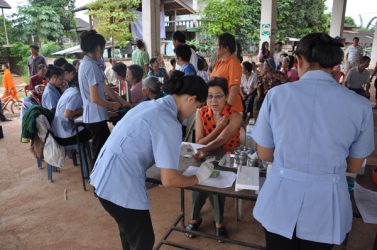
Challenges faced by the Thai health system at the local level
Source: https://www.bangkokbiznews.com/health/well-being/1138327
Photo Credit: https://www.hfocus.org/content/2018/05/15874

The transfer of public health service missions to the Local Government Organization (LGO), following the Decentralization Plan and Procedure Act, has seen Subdistrict Health Promoting Hospitals (SHPH) and Chaloem Phrakiat Health Stations transferred to the management of the Provincial Administrative Organization (PAO). This marks a historic step in strengthening the community health system.
Especially since 2022, over 4,276 SHPHs have been transferred, representing 43.31% of the country’s total 9,872 SHPHs. This is regarded as a drastic reform of the health service system nationwide.
During the two-year transitional period, numerous challenges emerged. One significant challenge was empowering the PAO to organize the primary healthcare system in accordance with the Primary Health System Act of 2019. This represented a new and concrete mandate. Previously, this was merely a theoretical power and duty of the PAO, lacking any practical implementation, and it had persisted for an extended period. Therefore, this is a significant and new issue for the PAO.
A support mechanism fostering collaboration among agencies experienced in organizing public health and medical services, or “system governance,” can strengthen the community health system’s potential at the local level.
“The crucial aspect of promoting health is a process that empowers people to control and improve their own health, or provides opportunities for communities to address challenges independently”, said Professor Wuttisan Tanchai, former Secretary-General of King Prajadhipok’s Institute, during a special public forum titled “From area operations toward policy proposals: Challenges faced by the Thai health system at the local level,” organized by the National Health Commission Office (NHCO), Health Systems Research Institute (HSRI), and the Association of Provincial Administrative Organizations of Thailand. (July 19,2024)
Regarding COVID-19, two key issues emerged: spatial management and decentralization. During the recent pandemic, a centralized problem-solving approach was implemented, yet the situation worsened. However, decentralizing power to provinces led to improvements, which reflects that local management effectively addressed the issue.
In concordance with two research projects under the NHCO, the first, titled ‘Research and develop project to find cooperation mechanisms between local government organizations to oversee the local health system, under the context of transferring SHPHs to the PAO,’ aims to facilitate inter-agency collaboration at the provincial level.
The latter research, titled “Enhancing the potential of dealing with health crises with innovative community-based primary health system management project: A case study of Bangkok communities and other provinces,” was initiated in response to the COVID-19 pandemic. The research explores the potential of localities and communities to develop measures for disease prevention and control, as well as establishing a system to address challenges based on local social costs, ultimately leading to social innovation, for example, a solid volunteer system, a system for providing assistance to vulnerable groups, a food management system, a community isolation centre / a waiting centre management system, and a system for coordinating care and referring patients.
These research projects aim to stimulate the development of community social innovation and social participation. While the current situation is not critical, preparing for future crises is essential. The NHCO and the research team believe that facilitating a robust provincial working mechanism, combined with sub-area-level social innovation, can strengthen the community-based health system and ultimately improve the health of the Thai population nationwide.
From the study, several interesting policy proposals emerged.
Regarding system governance, the following recommendations are made:
- The government should provide more intensive support for local health decentralization.
- The government must support and trust local communities in establishing community health service goals and standards, reducing central control, and adjusting power dynamics. This empowers the local community and civil society sectors to set their own directions, indicators, goals, and methods for implementing healthcare. Additionally, the government should foster multi-sectoral participation to enhance service quality.
- The Decentralization Committee, in collaboration with the Public Health and Interior ministries, is driving and supporting the transfer of SHPHs according to the plan. This pragmatic policy delivers tangible benefits to society.
Meanwhile, innovations in organizing the primary health system are underway. For instance, the Department of Local Administration and the Bangkok Metropolitan Administration (BMA) are leading efforts to empower urban communities in building community health aligned with local context and social capital. Key strategies include creating and supporting community mentoring units and developing community health information systems linked to national and spatial data.
Dr. Suthep Petchmark, Secretary-General of the National Health Commission, emphasized that COVID-19 underscored the critical importance of primary healthcare systems, particularly the collaborative efforts between localities and communities to deliver people-centered services. Findings from the two research projects highlighted the need for developing cooperation mechanisms among local administrative organizations.
This involves establishing Provincial Health Assemblies and collaborating with local academic institutions to govern the local health system. A key emphasis is on inclusive participation across all sectors and levels, from policy development to evaluation. Additionally, supporting the creation of community mentoring units and piloting new service models are essential for empowering communities to reach their full potential.
Dr. Supakit Sirilak, Executive Director of HSRI, highlighted that Thailand’s journey to becoming the world’s fifth-ranked health system was not without its challenges. However, the system’s current success is built upon a strong foundation established in the past and continuously developed through the effective application of knowledge.
Academic support is essential for health system development. The recent transfer of SHPHs to local governments marks a significant milestone in primary healthcare. Numerous aspects demand academic input, particularly for PAOs assuming management alongside communities and implementing community-based initiatives. These include tasks such as independent medicine procurement, local collaboration, and managing National Health Security Fund (the Universal Coverage scheme) service fee allocations. HSRI is committed to funding research in this field and will continue providing support.
